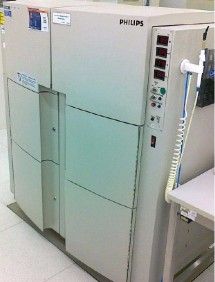Specific Process Knowledge/Characterization/X-Ray Diffractometer: Difference between revisions
| Line 10: | Line 10: | ||
X-ray diffraction is a non-destructive technique to measure the lattice mismatch of epitaxial grown layers. The resulting measurements are also know as rocking-curves. In this way it is possible to get the relative content of e.g. In in Ga<sub>x</sub>In<sub>1-x</sub>As grown on InP. Ga<sub>0.47</sub>In<sub>0.53</sub>As is lattice-matched to InP. Compunds containing three different materials are also called ternaries. | X-ray diffraction is a non-destructive technique to measure the lattice mismatch of epitaxial grown layers. The resulting measurements are also know as rocking-curves. In this way it is possible to get the relative content of e.g. In in Ga<sub>x</sub>In<sub>1-x</sub>As grown on InP. Ga<sub>0.47</sub>In<sub>0.53</sub>As is lattice-matched to InP. Compunds containing three different materials are also called ternaries. | ||
For more complex compounds containing 4 elements, known as quaternaries, e.g. Ga<sub>x</sub>In<sub>1-x</sub>As<sub>y</sub>P<sub>1-y</sub>, it is possible to obtain both x and y by combining x-ray diffraction measurements and PL-measurements (see [[ | For more complex compounds containing 4 elements, known as quaternaries, e.g. Ga<sub>x</sub>In<sub>1-x</sub>As<sub>y</sub>P<sub>1-y</sub>, it is possible to obtain both x and y by combining x-ray diffraction measurements and PL-measurements (see [[Specific Process Knowledge/Characterization/PL mapper|PL Mapper]]). | ||
==Equipment performance and process related parameters== | ==Equipment performance and process related parameters== | ||
Revision as of 10:55, 13 August 2019
Feedback to this page: click here
X-Ray Diffractometer

The Philips DCD IIH x-ray diffractometer used to characterize the layers on epitaxial semiconductor structures - usually III-V compound semiconductors.
The X-Ray Diffractometer is maintained by DTU fotonik (not Nanolab) and is therefore not in LabManager!
X-ray diffraction is a non-destructive technique to measure the lattice mismatch of epitaxial grown layers. The resulting measurements are also know as rocking-curves. In this way it is possible to get the relative content of e.g. In in GaxIn1-xAs grown on InP. Ga0.47In0.53As is lattice-matched to InP. Compunds containing three different materials are also called ternaries. For more complex compounds containing 4 elements, known as quaternaries, e.g. GaxIn1-xAsyP1-y, it is possible to obtain both x and y by combining x-ray diffraction measurements and PL-measurements (see PL Mapper).
| Performance | Excitation |
|
|---|---|---|
| Detection |
| |
| Sample size |
| |
| Resolution |
| |
| Materials | Allowed substrate materials |
|
